Zanzibar Gloom
(Marie-mail #51)
DAR ES SALAAM TO ZANZIBAR
SEPTEMBER 11
I was out of my room and up at eight, waiting for the Safari Inn's internet cafe to open.
It finally opened at a quarter to nine and somehow three others who had arrived after me were chosen to go first. I sat waiting until 9:30. I'd never waited and hour and a half for the internet before, and resolved to not return to Safari Inn after my trip to Zanzibar.
I gave up and walked towards the port.
"Jambo," said a taxi driver, brightly. Officially, "jambo"
means "hello" in Swahili. But to tourist in Tanzania, it means "look
at me, I want to sell you something."
I have received e-mails from people who are shocked that I am not more
tolerant of the innovative methods employed by local entrepreneurs in
their attempts to part me from my cash. To them, I say "trust me, if your
daily routine included being accosted forty times an hour every time you left
your residence, you'd tire of it too." And while sellers have a right to
come up with clever ways to engage me, I have an equal right to try to outsmart
them.
Smile but be firm and eventually "jambo" will just be background
noise.
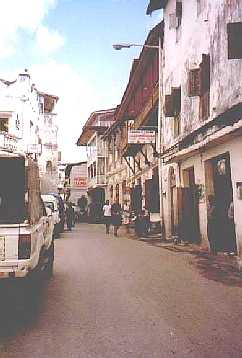 streets of Zanzibar
streets of Zanzibar
The catamaran was full of a mixture of locals and overland truck
tourists. I had a Coke and cookies for breakfast -- there wasn't much
of a selection on the ferry.
On the Zanzibar side, touts dogged me all the way from the port to the hotel.
"Listen," I said. "I already have a reservation, so you're wasting
your time. You're not getting a commission for a pre-booked room."
Nevertheless, one of them persistently followed me the whole way to
Emerson and Green Hotel, an
atmospheric hotel dubbed "one of the best small hotels" by London's Sunday Times. It was a splurge for me, even though I'd gotten a discount and taken the
cheapest room.
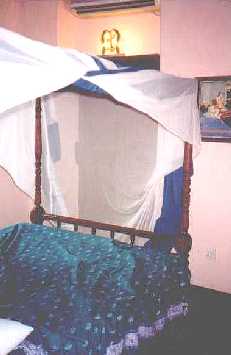 Kipembe suite at Emerson and Green
Kipembe suite at Emerson and Green
The bellhop showed me around. It was an old mansion, and each room (or
suite, really) was individually decorated with antiques, tiles,
hardwood, and ceiling fans. Legend had it that Emerson and Green had been the second tallest building in town, and the dinners on the rooftop terrace are legendary. I booked myself in for that night's dinner and went for a walk.
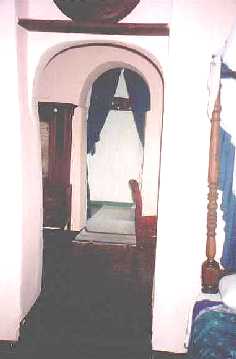 Kipembe suite at Emerson and Green
Kipembe suite at Emerson and Green
The tiny alleys reminded me of Damascus or Jerusalem. Barely three
people could walk side by side, but that didn't stop motorbikes,
wheelbarrows, and small vehicles from plowing down the walkways. They were a maze, with no discernible pattern, and I would have been lost without my map. Most of the ground level dwellings were storefronts, many of them selling souvenirs and tours. Much is made of Zanzibar's Arabic population and Middle Eastern feel, but it is unique because it is also very laid-back and African.
I stopped in at an internet cafe, checked my mail, and walked out into the main lobby to pay.
The tv was on. CNN was on. Two very familiar buildings were on tv.
They were on fire.
It was a rhetorical question, really. I just needed confirmation that
I wasn't insane.
"Is that the World Trade Center?" I asked shakily.
The two kids who worked at the internet cafe nodded and giggled. They
thought it was funny that two giant skyscrapers were on fire.
"A plane hit it," they said with apparent delight, and then noticed my
expression. "What's wrong?" asked one of them. I had probably gone
pale.
"That's an office building," I said. "Lots of people work there."
The kids quit giggling.
"How many?"
"Thousands, THOUSANDS," I replied.
Other tourists that happened through stopped and stared. Two were
Americans, and one of them, a young woman from Los Angeles, was as
teary and whimpering as I was.
But we'd seen nothing yet, of course. The Pentagon was hit too, and
false reports had us thinking that fires and carbombs were going off
all over northwest DC.
At home, Yancey watched live from the river as the twin towers
collapsed, damaged in their steel cores, their metal frames unable to
sustain their weight.
"I've never seen anything more horrifying," e-mailed Yancey, just
before he went to give blood.
Other friends saw it from their roofs, and watched soot-covered
business people trudging northward throughout the day. My entire
neighborhood was closed down, and fresh food couldn't get in for days. One of my friends, Larry Hama, lives just a few blocks north of "Ground Zero." He was volunteering at the election polls that morning and watched the second plane approach, alter its course twice, and then plow into the south tower. He reported expensive women's shoes lying on Broadway, deserted by fleeing owners. He and his wife walked north for miles, carrying their dog, and had to stay with friends in Queens for weeks. He now lives with the reality of possible airborn asbestos, freon, and toxics from burning plastic.
I knew none of this at the time... all I knew was that for the first
time, my mother sent me an e-mail that she was happy I was in Africa
instead of home in lower Manhattan.
People from all over the world stared at CNN with me, shook their
heads, and grieved over the loss of innocent lives. Local Muslims were
as distressed as tourists. There was no anti-American sentiment this day
-- that came later -- for the moment, nationalities were forgotten and we were
all simply human.
Eventually, no one was crying anymore, and people were laughing
nervously -- in that way that people do when they don't know how to
behave. CNN's live broadcasts took on a cinema-esque quality, and we adjusted
slowly to the idea of a new world order being a possibility the next time we got out of bed. Friends e-mailed me with worries of World War III, and I developed alternate plans of evacuation, escape, and self-imposed exile, all
depending on the next moves by the U.S. government.
I went back to Emerson and Green and begged off of dinner. I couldn't
tear myself away from the news.
Vicki and Mubiana tracked me down through my hotel, and offered their
company. I was glad to have it, and we worried about the state of the
world together.
Finally, at ten o'clock at night, the internet cafe closed. I moved
next door to a hotel lobby, and watched silently some more, before CNN
was just repeating itself. I walked back towards Emerson and Green.
"Jambo," said a dreadlocked man in a suit, keeping pace with me in the
dark street.
"Hello," I said, quickening. He kept up.
"I would like to talk to you. Remember when you said we could talk.
Every time I see you, you are busy."
"Sorry, you're wrong." I had little patience for tout games this
evening.
"You don't remember me..?" I cut him off, knowing the rest of the
sentence, which would be "from the hotel," after which point I would
assume he worked at my hotel. After gaining my confidence he would try to sell me something or borrow a small amount of money.
"That is impossible," I said firmly. "I have just arrived."
He faltered and fell back on an old standard.
"Where are you from?"
"NEW YORK CITY," I said. "Lower Manhattan. I am not in a very good
mood today.
He stopped, leaving me to finish my walk alone.
ZANZIBAR
SEPTEMBER 12
My sleep was fitful and I woke up early.
I took the destruction of the World Trade Center very personally.
Probably most New Yorkers did.
But at least I was in a beautiful hotel room, instead of in the hell
of my closed down, smoke-filled neighborhood. My small "kipembe" suite
consisted of three rooms, decorated with antique furniture. I had the Emerson and Green's breakfast of breads, fruits, and Zanzibar coffee on the rooftop
terrace.
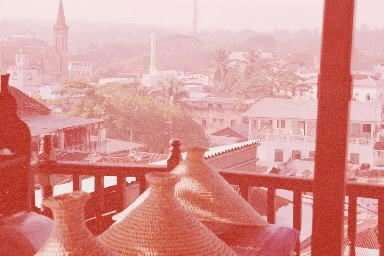 from the terrace at Emerson and Green
from the terrace at Emerson and Green
I went to see the town, but made the mistake of stopping by a
television first to catch up on the news.
An hour later, depressed, I tore myself away. The havoc in NYC was
grim, and I no longer cared that I was in Zanzibar. I spent the day
watching CNN and reading updates on the internet.
I also toured several small hotels. E&G was fantastic, but I couldn't
afford even a single night there and was being horribly irresponsible
by spending my money on it. The E&G cook had a cheaper guesthouse that
looked lovely but was still prohibitively expensive. The cheap hotels were
mostly shabby and disgusting. I wasn't sure what I would do when I left E&G.
I had an unexpected problem of being prone to sudden bouts of
weepiness. People were beginning to stare, and I couldn't very well
turn around
and tell them that if their city was in tatters, they would be upset
too.
At six, I met Mubiana and Vicki for a drink on E&G's terrace. The view
was nice, as anticipated, but the real charm was in the audio.
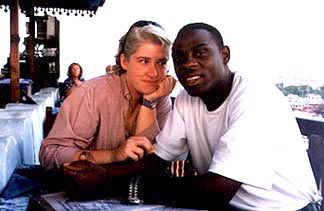 Vicki and Mubiana
Vicki and Mubiana
The call to prayer sounded from dozens of nearby mosques, and the
jangling bells at the nearby Hindu temple provided a suitable
multi-cultural accompaniment. Together with the conversation, I managed to take my mind off the tragedy at home.
But I'd have to watch events closely. When the inevitable retaliation
started, it could affect my route north. It was even conceivable that I
could end up stuck abroad.
SEPTEMBER 13
I moved to an airy top-floor room at the Karibu Inn for $15 a night.
It was no Emerson and Green, but I'd seen dozens of disgusting budget
hotels. Karibu was the best of the lot.
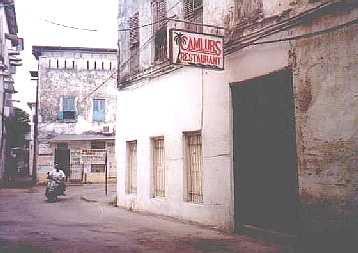 the house Freddie Mercury was born in
the house Freddie Mercury was born in
My Greek friend Thanos e-mailed me to remind me of a professor we'd
had in college. Will Roberts used to put his tv in the corner when it was
bad, and both Thanos and I now understood what he'd meant. The news had become
repetitive and desperate, and was becoming less relevant. The Onion
said it best: "Woman, not knowing what else to do, bakes American flag cake." I
understood her motives. No one knew how to act or what to do. Not being much of a patriot or baker, my solution was to stare at CNN, or wander the alleys of
Zanzibar in a daze.
The e-mails I got from home were startling. It was as if all my
friends had suddenly woken up that morning and decided to try to write thriller
novels. But of course the events they were reporting were not novice attempts
at fiction. They were all reporting their personal experiences. Offices
were closed, work had been brought to a standstill, the Captain America
artist had temporarily stopped drawing in despair, and planes were grounded.
Debris littered downtown Manhattan. The revolving door I'd once anonymously
shared with Lady Miss Kier of Dee-Lite at the CMJ convention was gone, along
with 6,000 people and Lower Manhattan's most reliably clean public restroom.
I outlined contingency plans in an e-mail home. There was the "get
home ASAP" option, the "stay put and lay low" option, the "bat out of hell
to South Africa" option, and the "ship to Australia" option. I still hoped to
continue my trip, which called for me to go overland through northern Sudan, but wouldn't be able to make a decision for some time. Perhaps I could
disguise myself as a Muslim woman.
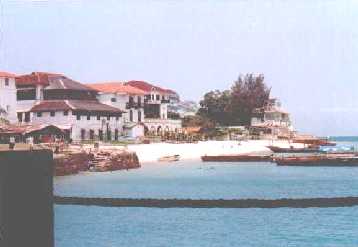 Zanzibar shore
Zanzibar shore
I sat by clear, aqua-colored seas, in an open-air restaurant under a
ceiling fan. There was no enjoying Zanzibar, I reasoned, and it was
expensive. I was miserable, and changing locations wouldn't help that. But at
least if I was going to be moping about, I could do it somewhere cheaper. I'd go back to Dar tomorrow. I'd be closer to the airport in case things went horribly wrong, and there would be fewer men saying "jambo, blondie, what are you doing tonight?"
ZANZIBAR TO DAR ES SALAAM
SEPTEMBER 14
I woke up under my towel. One thing I hadn't noticed when I'd checked
into the Karibu Inn was that it didn't supply top sheets or blankets.
I'd left my camping gear back in Dar, but my towel had been enough in the
tropical climate.
I successfully avoided touts all morning, and walked to the port to be
stamped out of Zanzibar.
Zanzibar is part of Tanzania. It's the "zan" in Tanzania. But
bizarrely, tourists must fill out forms and go through Immigration on
the way to and from Zanzibar. This seemed silly to me, so I inquired as to its
purpose.
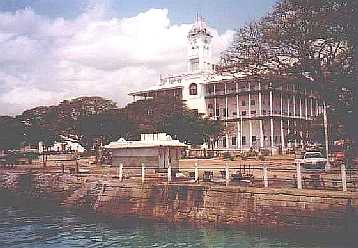 Zanzibar colonial building on the waterfront
Zanzibar colonial building on the waterfront
"This way we know how many tourists we have," explained a patient man
at Tourist Information. I wondered why they couldn't just count foreigner-priced ferry tickets, but left the topic alone.
DAR ES SALAAM
SEPTEMBER 15
The Luther House Hostel didn't appear to have hot water.
I'd been delighted with the hotel yesterday -- or would have been if I
had been in any state to be delighted. Luther House Hostel was much
nicer than Safari Inn, and had a terrace with a seaview.
But like the Safari Inn, it was shabby. I wanted comfort and
familiarity -- I wanted to go home, but couldn't now even if I had
seriously tried. Air traffic was chaotic, and flights were booked for days. The
best course of action, I'd decided, was to stay put, learn the flight
schedules, and pay attention to the news.
The reports from home alternated between bleak and optimistic,
depending on who was giving them. One of my editors said that "the
rhetoric of war is everywhere" and mentioned anti-Arab hate crimes were increasing. My mom thought it was calming down. Some wanted to find and prosecute the perpetrators while others asked for quick, violent revenge.
Taxi drivers and touts, attracted by my obvious "foreignness,"
cheerfully tried to snare me with cries of "jambo, where you from?" I
wanted to smack them, throw a tantrum, or maybe sit down and bawl. How could they be trying to sell me a trip to Zanzibar? Didn't they know we were in the
middle of a massive world crisis?
I ate lunch at Subway, dinner in a food court, and watched BBC in my
new hotel lobby (I'd switched to "Econo Lodge" after looking at several
hotels). Could I really just casually go on safari? But then, what
choice was there? Mope about in a crummy hotel or mope about with lions. I'd still be miserable on safari, but at least it would be someone else's
responsibility to feed me.
SEPTEMBER 16
"Jambo," said a man, keeping pace with me as I left Econo Lodge.
"Jambo," I muttered.
"What do you do today? Go to Zanzibar?"
"No."
"Tomorrow?"
"Already been."
"Safari then?"
"No. Goodbye."
"Goodbye" didn't always work, but it often gave them pause, and I'd
take advantage of the moment to walk away briskly.
"Jambo," said a handicraft seller. "You look nice. Can I talk to you?"
I managed to disavow him of this notion, and shook him after being
thoroughly rude. I ate at Subway, drank coffee at the Sheraton, and
took comfort in the familiar.
SEPTEMBER 17
The disaster at home was becoming part of my reality, as it was part
of the world's. I wasn't "over it," but I caught myself smiling at taxi
drivers instead of averting my eyes and looking downcast.
The world had changed. But I was going to try to continue if I could.
I'd had e-mails from home supporting my decision to forge ahead. There
was certainly no point in returning to New York at the moment.
I bought "The East African" newspaper and noted with dread that the
front page was devoted to the possibility of the US bombing Sudan. That
wasn't something I wanted to hear.
Inside, a variety of editorials made points (valid or otherwise) that
were not yet being made at home. One editorial suggested that Americans
had fancied themselves "divinely protected," and assured readers that
Americans had "xenophobia rooted in the political ignorance of even many highly
educated Americans."
"Yeah," I thought sarcastically, "and the rest of the world is so
politically sophisticated."
A professor was quoted as attributing it all to an egregious imbalance
of wealth. I was going to have to watch my back as an default participant in
the world order. It was all madness, as Charlton Heston pointed out in
the "Planet of the Apes," a movie that suddenly seemed very relevant.
We were all being reduced to primal urges and xenophobia, and the chimpanzees
can only watch the horrors unfolding around them, even in the high council,
which is somehow complicit in it all.
One columnist pointed out that Iran society was a microcosm of the
battle of conservative versus progressive Islam. He was right -- when I
was there in '98, the forces of progress (Khatami and the moderate left) were fighting for social change against mullahs and conservatives. Although it must be said that Iran, at its most conservative, never forced women to give up working and wear screens over their eyes, the way they must in a few countries.
Another columnist mentioned that people don't deserve death for the
crime of being wealthy, and another worried that justice would take a
back seat to politics.
Still another begged American to not let Israel's battles influence
its own, and asked the US to work with Malaysia, Pakistan, Egypt and the
Saudis to solve the terrorism problem.
And finally, one editorial pointed out that the US had not intervened
when 800,000 Rwandans were killed. Which explains why those around me
though the World Trade Center collapse was a sad story but might as well have
happened on the moon. Lower Manhattan was a world away, as far as Rwanda was to
us when the Hutus and Tutsis went at it in 1994.
I bought instant oatmeal, peanut butter and jelly, bread (which I
watched get sliced in a bread slicing machine), some pastries and a
Coke. My standards had slipped a long time ago, and I considered this a treat.
DAR ES SALAAM TO ARUSHA
SEPTEMBER 18
I got up at six. The toilet still flushed intermittently, there were
still cockroaches in my room, and the ceiling fan creaked. But Econo
Lodge was much nicer than Safari Inn, Luther House, or the Starlight Hotel I'd
looked at. It was too early for hotel service, so I substituted a Coke for coffee and bread for breakfast.
I caught a taxi to the Scandinavian Express bus station. They were
reputedly the safest and best bus company, and if nothing else at least
had their own station close to the center of town.
Along with a few Africans and five tourists, I boarded a "luxury" bus
filled with mosquitos, and started the nine hour trip to Arusha.
The bus started up. The a/c came on. A cockroach fell on me and we
were off.
The bus hostess -- commonplace on buses outside the US -- called ahead
to Arusha and lined up a ride for the tourists on board. The ride was a
safari company's Land Rover, who first suggested we use their services and
then took us to a friend's hotel. Fair enough -- the ride was free, so they could get a kickback. And the friend's hotel -- Arusha Centre Inn -- was less than ten dollars a night for a shabby en suite room with hot water.
I checked in and immediately set out to find a better place. I was
pleased that only two people tried to sell me stuff as I walked through
town. Arusha has a terrible reputation for persistent touts.
After visiting a few hotels that were three times the price but only
marginally better than the Arusha Centre, I booked a night later in the
week at "Mezza Luna," a pleasant and friendly Italian restaurant/hotel. I'd
stay put for now, for the sake of my budget.
Back at Arusha Centre Inn, I discovered that, like everywhere else
from Lusaka northward, it was infested with the common German cockroach.
East Africa, land of the lion, the cockroach, and the nose-picker, I
thought. When I wasn't busy smashing cockroaches, I'd be inadvertently
watching someone with their finger up their nose. No problem, I thought, I'd
find a new hotel tomorrow.
ARUSHA
SEPTEMBER 19-20
Obviously, I'd gotten soft. The Belgians in the next room like the
Arusha Centre Hotel just fine. I'd eaten only western food for a week,
and had pancakes and coffee for breakfast. Perhaps my latching onto the
familiar was some sort of grief process.
I had fresh Tanzanian coffee at Jambo Coffee House, a friendly place
decorated with six-foot tall wooden giraffes and happy coffee pots, and
went to find a cockroach-free room.
"New Safari Inn" was all right and had the added bonus of having
housed Hemingway. "Hotel Equator" was outrageously expensive. "Mashele" and
"Meru House Inn" may have been okay, but they were not centrally located.
"Arusha Naaz" was good and twenty dollars a night. "Outpost" was all right but
overpriced for what it was.
Somewhere along the way, I realized that it was stupid of me to spend
all this time looking for a room when I knew that Mezza Luna was nice,
so I went there and checked in two days early.
The staff at Mezza Luna was exceptionally cooperative. They were happy
to do my laundry, excitedly told me that breakfast was included with
the room, and laughed when I asked about the safe deposit box.
"It will be safe in your room," said the receptionist smugly.
I left Mezza Luna and walked down a busy, tree-lined road to the town
center. Instead of the usual greeting "jambo would you like to buy..."
the locals on this end of town went about their daily lives. Children
walked to school in uniforms. Teenage boys in red and black checked Maasai
blankets walked by in high-tech running shoes. A soccer game was in progress
nearby.
"Karibu," said everyone who passed me. It meant "welcome" in Swahili,
and in Arusha everyone said it non-stop. One African teenager who said
"karibu" was dressed in baggy jeans, running shoes, and a floppy hat. He was the spitting image of an African-American teenager -- influenced by styles
that in turn had been influenced by African culture of over a hundred years
ago.
I was in a pretty good mood until I picked up a newspaper. Then I
discovered the anti-American backlash had begun in force.
The initial shock and revulsion had worn off, and today's papers were
filed with editorials sniping at the US.
Some believed it was time that American got a little of what it dishes
out. Others welcomed the promised land to the "real" world, and others
claimed that U.S. policy had provoked this.
This incensed me. America has made its share of mistakes and certainly
has a lot to answer for on a global scale, but no one who got up on
September 11 and went to work at the World Trade Center or boarded an airplane
bound for the west coast had anything to do with policy-making.
When I was younger, I thought that "by any means necessary," had a
point. I had been different and the world had been different. Now I
thought that was a lot of crap. It had gotten the Palestinians and Israelis
nowhere, and would only result in more violence and the closing of an open
society.
Was it possible, I wondered, to begin a constructive dialogue between
rich and poor countries out of such a misguided, tragic action?
I took myself out for Ethiopian food on my last night alone in Arusha.
This was a first for me -- eating Ethiopian food is something you do in
a group, unless you are Ethiopian. But I'd gotten brave about going solo,
and no longer cared if I looked like a loser.
To my surprise, there was a photo of President Clinton on the wall.
The restaurant had catered a dinner for the President when he'd visited
Arusha. This was the third place I'd eaten at that had fed him, and I'd also
seen his photo in Guatemala and his wife's photo in Istanbul. Surely there was
somewhere I could go that "billsworldtour" hadn't gotten to first.
The restaurant owner told her helper to escort me home. Fortunately,
Mezza Luna was only a short walk away.
NEXT: on safari with Guerba! The Serengeti, Ngorongoro Crater and tree-climbing lions.